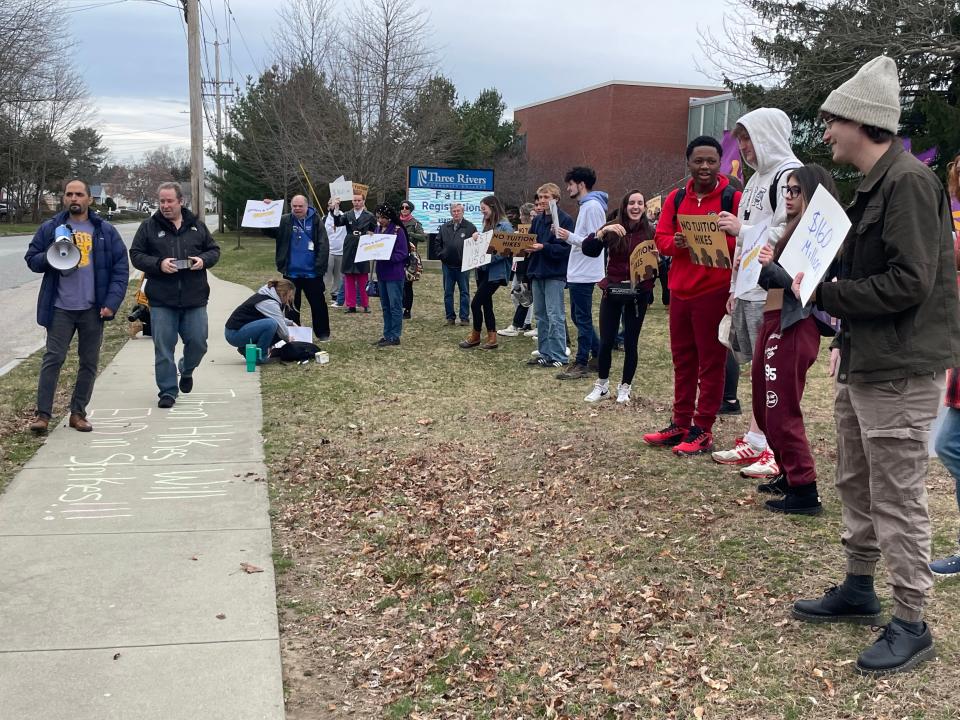Three Rivers CC students, faculty picket for more funding: why are the issues?
The consolidation of the state community college system may have been one of the biggest mistakes Connecticut has ever made, Three Rivers Community College Professor Diba Kahn-Bureau said.
Students, professors and union leaders picketed outside of Three Rivers Community College Monday, seeking more funding for the community colleges, and to avoid an upcoming 5% tuition increase.
To reduce the impact, CSCU is asking the state for $47.6 million in funding, of which $41.3 million would go toward the 12 community colleges. In the meantime, the system has reduced student and food services to save $100 million and approved the tuition hike, Communications Director Sam Norton stated in an email.

“CSCU has done its best to operate within the budget it has been allocated, but our students have incredible levels of need,” Norton said.
Students and faculty picket for more funding
The group of almost three dozen protested by the road, chanting and holding signs. They want more money for the community college system: $160 million.
The state budget needs to stay within its limits, and Gov. Ned Lamont is not interested in declaring an emergency to go beyond the budget, state Sen. Cathy Osten, who is also co-chair of the Connecticut General Assembly’s Appropriations Committee, said Friday.
Community college attendance may be a bigger problem than the deficit, which makes it hard to justify increasing funding, especially for a figure that’s “above and beyond what we have the authority to spend,” Osten said.
“Costs have gone up, and they want us to take on the additional cost,” she said.
Cost reductions impact student experience
These cost reductions impact the student experience. Nick Fleurose said it affects how many hours he has at his work-study job, he said.
“I can’t afford to stay (at the work study) and I might have to get a new job,” he said.
Another student, Cayden Washko, normally spends free time in the gym, but the reduced hours means he has to fix his schedule around it, he said.
Limited hours in the library affects students who don’t have internet or computer access at home, Brianna Mendez said.
“It’s important for us to support our school, especially with the time we are going through,” she said.
Manchester Community College student Alissa Pace, who spoke during the speaking portion of the demonstration, said these issues aren’t contained to just Three Rivers.
“They exist everywhere,” she said. “You know someone who is facing these problems.”
Problems at Pace’s school include a cut in work-study hours, a reduction in library hours, and more, she said.
Tuition increases put affordability at risk
They are also trying to avoid the planned 5% tuition increase. Tuition was already increased by 3% last year, and 38% in the past decade. Community college students, which include people who are working or raising families, find they have to choose between paying a bill or paying tuition, Capital Community College Professor and SEIU Local 1973 President Seth Freeman said.
The reduction of services has gone on all year, and students and the union have brought attention to the issue, Freeman said.
“We’re confident legislators are aware of the problem, and we’re optimistic they’ll pass emergency funding,” he said. “It may not be to the tune of $160 million, but it needs to be enough to reverse the cutbacks and stop tuition hikes.”
The tuition increases hurt the community college student population, including working adults, first-generation college students, and people of color, Kahn-Bureau said.
Fleurose and Washko are also concerned about the affordability of community college for their younger siblings.
“I want to make sure they’re not affected as we are now,” Washko said.
Kahn-Bureau remembered how the community college system supported her as a student financially and in other ways, unlike now, she said.
“The governor does not want to fund the community college system, period," Kahn-Bureau said.
Merging at 12 community colleges into one administration was supposed to be cost-saving measure
This is a consequence of Connecticut State Colleges and Universities consolidating under one administration, said Kahn-Bureau, whose full title is professor and coordinator of Environmental Engineering Technology Program.
The state decided to merge all 12 community colleges under a single administration in 2017. The process finished in July 2023.
The merger was touted as a cost-saving measure, but it has evidently caused costs to rise. Thus, Lamont, state legislators, and CSCU itself should be held accountable, Kahn-Bureau said.
“The students are going to bear the brunt of this mismanaged, bureaucratic system,” she said.
Kahn-Bureau is critical of the administration’s spending including hiring more middle management positions, and the move to a new administrative office, she said.
Norton replied that that the move expenses were paid by state capital funds and not the CSCU operating funds.
This article originally appeared on The Bulletin: Three Rivers students, faculty picket to protest tuition hike

